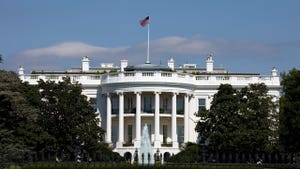US Lawmakers Urge Pushback on EU’s Big Tech Crackdown
The EU’s Digital Markets Act will be too costly for American tech firms and workers, a bipartisan group of lawmakers writes in a letter to US President Joe Biden.

At a Glance
- Lawmakers say focus on US big tech firms is “discriminatory” and will hurt the economy.
- What IT leaders need to know about Europe’s stance on digital market regulation.
- Senate leaders also fear DMA’s impact on US tech industry.
A group of lawmakers has penned a letter warning US President Joe Biden that the European Union’s landmark Digital Markets Act (DMA) takes unfair aim at five US “gatekeeper” service providers, including Google parent Alphabet, Amazon, Apple, Meta, and Microsoft.
Twenty-two members of the US House of Representatives -- 10 Republicans and 12 Democrats -- signed the letter, which warns that the DMA could harm American economic and security interests and prompts Biden to ensure the EU’s rules are fairly enforced.
The DMA will limit the way companies combine user data to gain competitive advantage, among other antitrust measures aimed at big tech firms offering services to millions of people globally. While many of the companies are based in the US, China’s ByteDance and TikTok were also included on the list.
“Securing our leadership in this sector is imperative for our economy and American workers,” the letter said. “The designation of leading US companies as ‘gatekeepers’ threatens to upend the US economy, diminish our global leadership in the digital sphere, and jeopardize the security of consumers.”
Starting in March 2024, DMA will require gatekeeper-designated companies to allow messaging apps to work with rivals and give users choice over which they want pre-installed on devices. The letter says signees were “disappointed by the lack of a strong coordinated US government response to the clear targeting of US companies by EU policies, especially under the DMA."
The letter goes on to list measures to address “near-term risks to the American economy, companies, and workers” by investigating Europe’s “digital sovereignty” agenda that could compel US companies to transfer US data and secrets to foreign countries.
The letter cites a Center for Strategic and International Studies (CSIS) report that estimates DMA’s rules will cost American companies $97 billion and limit US exports to Europe at least $13 billion.
Caitlin Chin-Rothmann, a research fellow for the strategic technologies program at CSIS, tells InformationWeek in an interview that the DMA, along with the EU’s other digital regulations, could drive businesses to avoid EU activity. “We’ve been hearing these concerns for years,” she says. “Initially, Threads (Meta’s microblogging platform) didn’t launch in the EU because of regulatory concerns. Many companies will need to adjust their business models and the regulations could disincentivize companies from launching new services.”
She says it’s unlikely the letter will have an immediate impact on the new laws. “I do think it’s unclear how much leeway there is for the EU to change its policies at this point. The US has been historically slow to regulate the digital market. So, at least in the short term, companies are going to have to adjust to EU law, rather than the other way around.”
DMA Important for IT Leaders
CIOs, CISOs, and other IT leaders should keep a watchful eye on the EU's regulatory developments, Martha Heller, CEO at executive search firm Heller Search, tells InformationWeek.
“The EU’s legislative move to curtail the power of US tech companies is a double-edged sword,” she says in an email interview. “Its mandate that the largest US-based tech companies give users more choice among services could give smaller technology companies a fighting chance. But its bias against US tech companies could limit the US’s ability to compete on the global market.”
Heller adds, “As both producers and enterprise consumers of technology, CIOs, and CTOs should pay close attention to the EU, as it leverages its watchdog position.”
For CIOs, keeping track of regulatory considerations is not getting easier moving forward. “You have five big US tech companies that are primarily affected,” Chin-Rothmann says. “You must look at that in context with all of the other digital laws globally. It’s going to be a pretty complex regulatory patchwork. And when the EU regulates, other countries tend to follow suit."
Earlier Letter Shows Concern in Senate
Members of the US Senate Committee on Finance in March also sent a letter pressing Biden to call on the EU to reconsider its approach, calling the focus on American companies “discriminatory.” Senate Finance Committee members Ron Wyden (D-Ore.) and Mike Crapo (R-Idaho) signed the letter.
“We support thoughtful, even-handed policies to protect consumers and encourage competition online,” Wyden and Crapo wrote. “However, regulatory efforts that discriminate against US employers and their workers by exempting the EU’s domestic companies, and even other foreign companies, are both unfair and counterproductive to the purported goals of ensuring privacy, protecting consumers, and promoting national security.”
The letter included the Digital Services Act (DSA), which is focused on content and recently announced a probe of microblogging platform X, formerly known as Twitter.
“The DSA and DMA form the cornerstone of the EU’s digital regulatory agenda,” the senators wrote. “These laws … are intended to promote laudable goals such as competition and consumer protection online. If the EU is serious about achieving these goals, however, it is wrong to enact legislation where the costs and responsibilities are borne principally by American companies without appropriately regulating European, Chinese, and Russian entities that engage in the same activities.”
About the Author
You May Also Like






